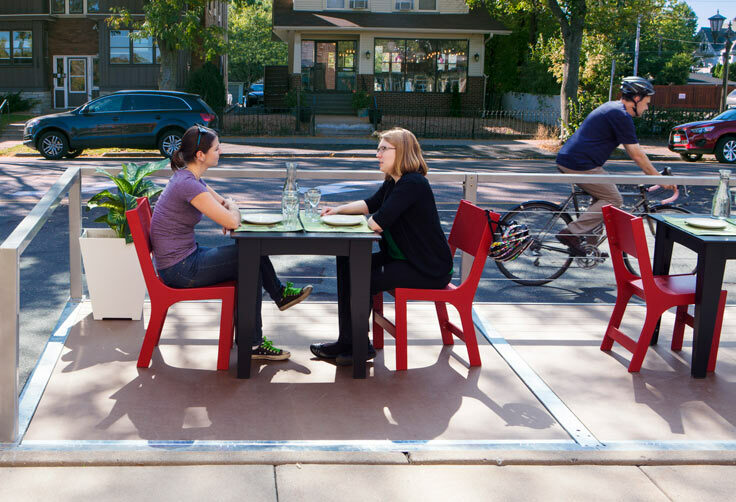If you visit a Portland restaurant this summer, you just might find yourself enjoying your lobster roll and craft beer in a parking space on the street. But don’t worry, you won’t have to feed the meter.
Portland has approved a pilot program for “parklets,” which are raised dining areas in on-street parking spots adjacent to restaurants that don’t have enough sidewalk space or a nearby public park for outdoor dining. Just five parklets will be allowed in the city during the first year of the program.
There are conditions. Parklets will be allowed only on streets where the speed limit is no higher than 25 mph and average traffic volume is lower than 5,000 cars per day. And a parklet can’t be within 15 feet of an intersection, where it might interfere with drivers’ right-of-way views.
“I think it’s actually a really exciting opportunity for the city,” said City Councilor Spencer Thibodeau, who serves on the Economic Development Committee. “We’ve dealt with these narrow sidewalks in the Old Port area, and it can provide a different approach to the outdoor dining experience for our businesses.”
The idea for a parklet program was first raised in 2016, Thibodeau said, but the City Council did not approve it until April 8 because it was not allowed under state law. That law was recently changed, and establishments with liquor licenses are now allowed to serve alcohol on city-owned property that’s not immediately adjacent to the business.

An example of a “parklet” in New Haven, Conn., where a parking space has been turned into a place for restaurant seating. Photo courtesy of Urban Canopy Project
Restaurant parklets are common in other parts of the country, such as Bethlehem, Pennsylvania. Casey Gilbert, executive director of Portland Downtown, said there are parklets in Long Beach, California, and Adelaide, South Australia, and Thibodeau has seen them in Montreal.
“I’ve definitely seen it work in other cities,” Gilbert said. “They tend to be built structures.”
The dining areas must be on raised platforms, both for safety reasons and to allow stormwater to flow underneath them. The platforms are typically built to curb height, allowing accessibility for diners with limited mobility.
Jeff Levine, director of the city’s planning and urban development department, said most parklets can hold a couple of tables, with perhaps four seats per table.
“We don’t limit the number of tables as long as it’s laid out safely,” he said.
One big unanswered question: How will Portland residents react to having more on-street parking taken away in a city that is already parking poor? Thibodeau said the city doesn’t want parklets “taking over entire streets.”
“We’ve got more restaurants here,” he said, “and it’s just a more creative way to get people outside, I think.”
Levine said he considers the issue a balancing act, between the need to have a vibrant downtown district and those of local restaurants and drivers. Concern over parking, he said, is one reason the city is starting off with a pilot program that allows only five restaurants to participate at one time.
“We talked about (parking) a lot as an issue because we want to make sure people can get downtown,” he said.
The parklets are required to have appropriate safety barriers surrounding them, such as stanchions and ropes, curb stops, planters or freestanding fencing, to protect diners from traffic. The “parklet season” will be from April 1 to Nov. 15, after which the parklet must be removed from the street and stored for the winter.
The permit fee for a parklet is $5,520 per season, which the city says is equal to the revenue from a typical downtown parking space. Restaurants with parklets are also expected to have liability insurance. Levine said he expects the cost to build a platform will be a few thousand dollars, “more if they build something unique.”
Portland Downtown did not take an advocacy stance on the program, but encouraged its members to provide the city with feedback.
“While I think it’s probably a good idea,” Gilbert said, “it does seem like it would be an expensive endeavor to have a platform created.”
Joshua Miranda, owner of Blyth & Burrows at 26 Exchange St., said he might be interested in applying for a parklet permit in the future, but probably won’t this year because he doesn’t want to spend the extra money at a time when he’s trying to open a new restaurant. But he thinks parklets are a good idea for Portland.
“I feel that it would add to the ambience of the Old Port,” he said. “I’ve seen some good ones.”
Andrew Volk, co-owner of the Portland Hunt & Alpine Club, said he will apply for one of the five parklet spots. He said he has tried installing sidewalk seating before, but it’s difficult to follow the clearance requirements with less than 8 feet of sidewalk to work with. He’s not worried about the cost of a parklet, pointing out that his business has been doing just fine without outdoor seating in the six years it’s been in Portland.
“You only pay for it once,” he said, “and having outdoor seating in the city is a really great opportunity.”
Send questions/comments to the editors.




Success. Please wait for the page to reload. If the page does not reload within 5 seconds, please refresh the page.
Enter your email and password to access comments.
Hi, to comment on stories you must . This profile is in addition to your subscription and website login.
Already have a commenting profile? .
Invalid username/password.
Please check your email to confirm and complete your registration.
Only subscribers are eligible to post comments. Please subscribe or login first for digital access. Here’s why.
Use the form below to reset your password. When you've submitted your account email, we will send an email with a reset code.